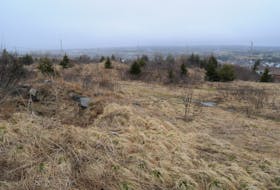“Heroes are human, too,” the president of the province’s largest union said Tuesday, calling on the government to establish presumptive legislation for post-traumatic stress disorder (PTSD) and occupational stress injuries.
A number of members of the Newfoundland and Labrador Association of Public and Private Employees (NAPE), including paramedics and sheriff’s officers, were on hand at the Alt Hotel in St. John’s Tuesday morning as Jerry Earle presented a newly released paper commissioned by the union calling for presumptive legislation.
Presumptive legislation refers to the acceptance of injury claims for a medical or psychiatric diagnosis without a worker having to prove the disorder is a result of an event or exposure while on the job.
The report, called “A Call for Presumptive Legislation: Post-Traumatic Stress Disorder, Occupational Stress Injuries and the Well-being of the Workplace,” was co-authored by experts Rose Ricciardelli and Alan Hall of Memorial University.
Related stories:
Government working on presumptive PTSD coverage for first responders
WorkplaceNL changes recognize on-the-job trauma
In their report, Ricciardelli and Hall said Newfoundland and Labrador is one of the last provinces without presumptive legislation, but could create a law that is more progressive than most. Most provinces focus on post-traumatic stress disorder, they said, and not the wide range of mental disorders that could result from trauma.
The researchers quoted results of a recent survey of public-safety personnel from across the country — including police officers, firefighters, paramedics, correctional officers and others — revealing high instances of mental-health issues.
Almost 45 per cent of the respondents reported living with one or more mental-health disorders, which is significantly higher than the rate of just more than 10 per cent in the general population, according to Statistics Canada.
About 23 per cent of the public-safety personnel surveyed reported having PTSD, 26 per cent reported major depression and 15 per cent reported generalized anxiety disorder. Correctional workers, RCMP officers and paramedics reported the highest number of mental disorders.
“NAPE members personally face and witness dangerous, threatening, violent or traumatizing situations,” Earle said. “These situations can have a deep and lasting impact that lead to operational stress, anxiety, sleep and mood disorders, etcetera. We must remember that what happens at work just doesn’t stay at work. It doesn’t go away when the uniform comes off, the shift is over or the day is done.”
Earle pointed out trauma can be caused by a single event or years of stress, and said it’s often difficult for workers to get the help they need, both because of a system that isn’t equipped to deal with mental health and occupational stress injuries, and a stigma around mental illness in many workplaces.
“We don’t need small changes, we need massive changes as to how we approach mental health in the workplace,” Earle said. “We need legislative change. Newfoundland and Labrador can’t wait any longer and it’s already too late for those who have lost that battle.”
In their report, which Earle emphasized was funded but not directed by NAPE, Ricciardelli and Hall made a number of recommendations for presumptive legislation for this province.
They said it should include mental-health injuries resulting from chronic stress; recognize that psychological injuries can be caused by cumulative as well as single stressful events; give the benefit of the doubt to the worker when a compensation claim is made; limit the grounds on which the diagnosis of psychological injuries can be challenged; recognize that work experiences and events and experiences outside the workplace are interlinked; and cover mental-health injuries that occurred prior to the date of the new law.
Last fall, the province said it was working on presumptive coverage for PTSD and occupational stress injuries for workers in this province.
In March, WorkplaceNL amended its policy to make it easier for those suffering from work-related mental-health illnesses to receive compensation. The new policy acknowledges that mental-health injuries can be caused by stress over time and not always a single incident, and includes an expanded list of mental-health issues.
“The provincial government, which we applaud, has indicated that they are willing and planning to move on this critical issue. We know that WorkplaceNL is conducting research and will be providing recommendations on this front. We did this paper to help inform that process,” Earle explained. “We have the ability to lead the country in this area, to create the most comprehensive presumptive legislation for workplace mental-health injuries in the country and among the most progressive in the world. Let’s embrace this opportunity.”
Twitter: @tara_bradbury









